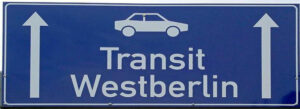West Berlin, Westberlin, West-Berlin, Berlin (West), B(W), BW?!?
It wasn’t until I’d finished my first draft of Stealing The Future that I started worrying about how to spell Westberlin (or West Berlin, West-Berlin or even Berlin (West)!). I’d blithely tapped away at my keyboard, using the Eastgerman (East German) vernacular, only realising that this may seem odd to a non-German audience, or even a Westgerman (West German) audience.
In English it’s really not very hard: West Berlin, West Germany, East Berlin, East Germany. But in German the way you spell West Berlin tells the reader something about you, and your politics. Yep, you guessed right, it’s about the Cold War, of course.
Two Berlins
In 1945 the Red Army marched into Berlin, and soon after the Americans, British and French turned up. The plan was to jointly administer the city, but the former allies soon fell out, and the city was divided. Trams and buses either ran in the West (the US, UK and French sectors) or the East (the Soviet sector), but didn’t cross over that political line. The ‘sector border’ was still fairly open – road traffic was blocked on quite a few streets, but pedestrians could cross over practically anywhere. This was the point in time when, if you hadn’t already worked it out before, you had to draw the conclusion that there were now two Berlins. The Soviet sector preferred to call itself The Democratic Sector or Democratic Berlin, and the West responded with the name Westsektor (for example in announcements on underground trains) for itself, or simply continued to refer to Berlin or Greater Berlin as if the city had not actually been split into two administrations.
In the 1960s there were attempts on both sides of the sector border to clarify the official nomenclature: just before the Berlin Wall was built, East Berlin changed its name to Berlin, Capital of the GDR. The official name that the GDR had for West Berlin was: selbständige politische Einheit Westberlin: “independent political entity of Westberlin” – which of course was only to be found on signs at border posts and other such official places. In semi-official contexts, such as maps and internal reports the use of Westberlin was common, and by the 1980s Berlin (West) had also been adopted in the East.
When East Germans talked about Berlin, they commonly referred to Berlin – the word Ostberlin was practically redundant – there was only one part of Berlin that most East Germans could actually visit and for them that was what they thought of as Berlin.
The West Berlin Senate on the other hand recommended the use of Berlin (West) and Berlin (Ost), or in informal usage, West-Berlin and Ost-Berlin, which was the style mostly used in West Berlin and West Germany.

Westgermany, West Germany?
The problem of naming West Germany/Bundesrepublik Deutschland has similar orthographical pitfalls. West Germany usually referred to itself as the Bundesrepublik (Federal Republic), or simply Germany. The East practically always referred to itself as DDR – the GDR, and the West as BRD (or, earlier on, DBR, for other political reasons that I won’t go into right now), or commonly just Westdeutschland.
In Stealing the Future the story is told from the viewpoint of an Ossi, so I have preferred to use terms that would have been familiar to him: Westberlin, Westgermany. Given the new freedom to cross into Westberlin I thought there would be more need for the East Germans to explicitly define their half of the city, hence the widespread use of Eastberlin.
East Germany, Eastgermany, GDR?
I have allowed myself to use the terms Eastgermany and Eastgermans – as I said above the GDR was not usually referred to as Ostdeutschland (except sometimes in the West), it preferred to use its title to underline its status as a (partly) sovereign state. Additionally the word Ostdeutschland has unpleasant revanchist echoes, referring previously to those parts of Germany that were ceded to Poland and the USSR after the Second World War.
Nevertheless the term East Germany is the most common term for the GDR in English, and I have merely run the words together to match the orthography that gave us Westberlin and Westdeutschland.
The exception to the rule is, of course, in speech given by Westerners – for example both Katrin and Annette talk about West Berlin, and the British major refers to West Germany.
More spelling headaches can be found in: Street Names, Streetnames, Street-names?
Update
Following reader feedback my publishers and I agreed to change Westberlin to the usual English spelling West Berlin. This happened in the second print run of Stealing The Future.